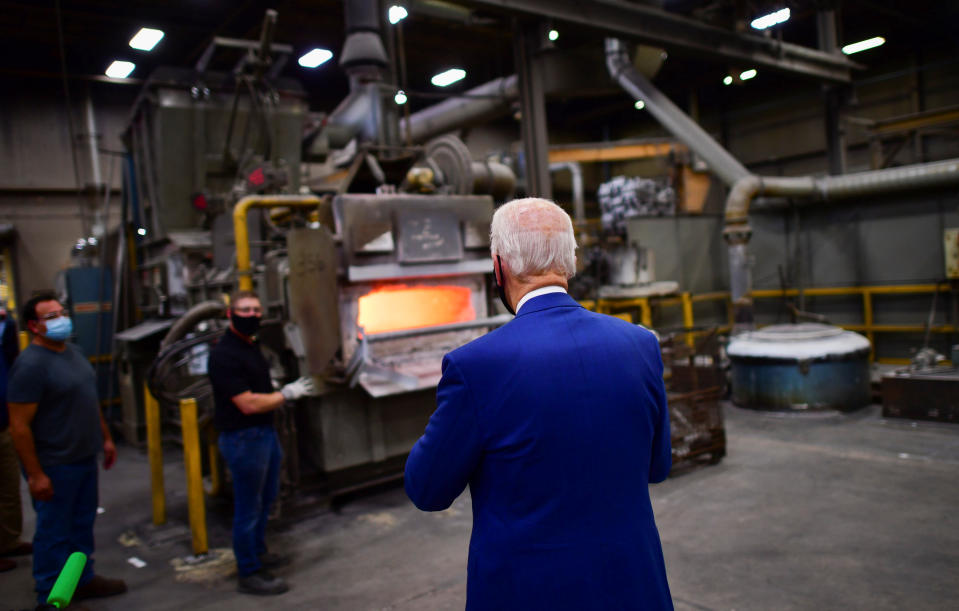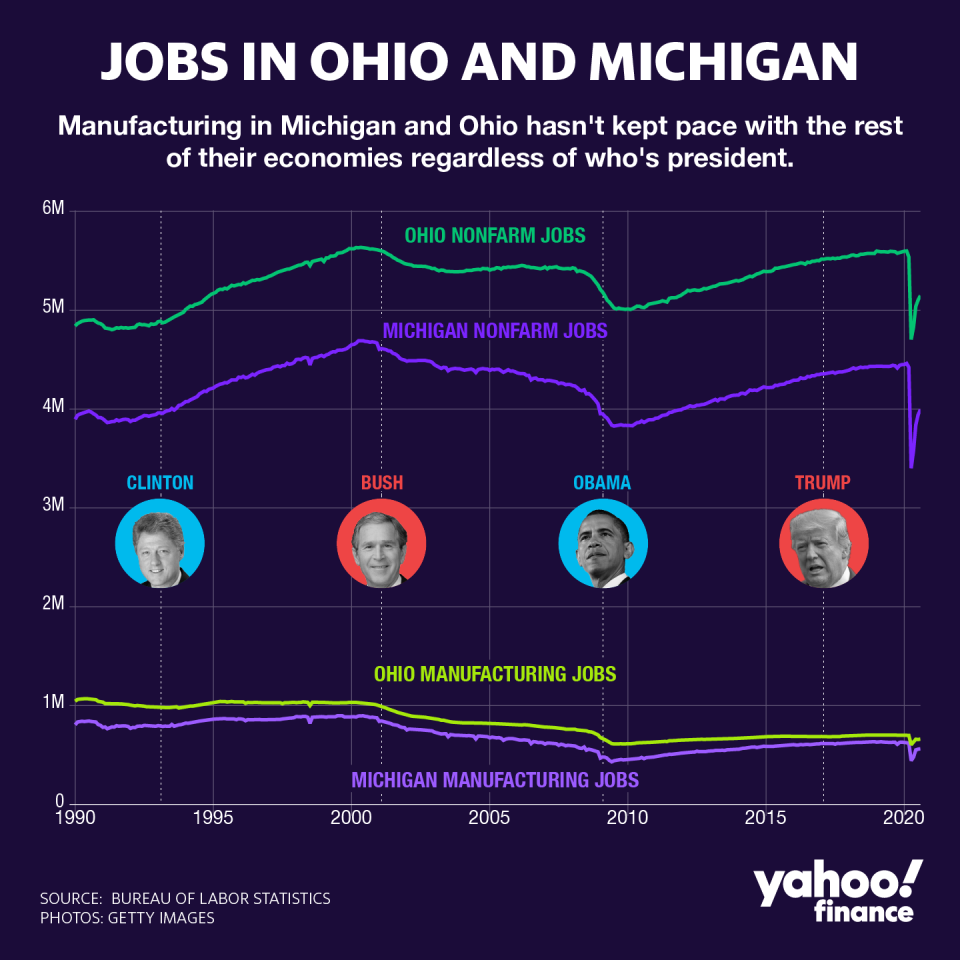‘They've heard all this before’: The manufacturing industry's skeptical response to Trump and Biden’s appeals
Making sky-high promises to voters who work in manufacturing has been a feature of American politics for decades.
And the 2020 campaign has seen the palaver on overdrive as President Trump and Joe Biden battle for a thin slice of undecided voters who primarily live in industrial midwestern states like Wisconsin, Ohio, Michigan, and Pennsylvania.
“What you'll hear people say, and I think quite understandably, is that they've heard all this before,” says Gabriel Winant, a history professor at the University of Chicago who studies the manufacturing economy.
The skepticism is being elevated by rhetoric that has often centered – especially from Trump – on broad promises of a manufacturing renaissance which, it seems, few fully believe at this point.
The president recently promised to “make America into the manufacturing superpower of the world.” Biden – who unlike Trump has released detailed plans for the sector – also makes promises for things like “a million good-paying union jobs in manufacturing,” as he did during a recent trip to Ohio.
The response is palpable skepticism. “We haven't seen much of anything from either camp,” says Kip Eideberg a senior vice president of government & industry relations at the Association of Equipment Manufacturers. His advocacy group represents companies like Deere (DE) and Caterpillar (CAT).

People ‘have been left behind by our elected officials’
During the current recession, manufacturing sector employment fell to around 11.5 million. It was part of a steady decline since the late 1970s. Back then, manufacturing peaked with nearly 20 million Americans employed in manufacturing.
For decades, the sector has declined or stagnated even as the rest of the economy expands. Manufacturing experienced a recession in 2016, the same year Trump overperformed in industrial states on his way to winning the presidency.

Eideberg notes that many of the workers he represents broke for Trump in 2016 but says they’re now deeply dissatisfied. “I think many of those people have been left behind by our elected officials, who have not articulated a vision for how to re-skill and re-train them,” he said in an interview with Yahoo Finance.
The Association of Equipment Manufacturers recently conducted a poll and found that 76% of Pennsylvania voters say a candidate's position on manufacturing is going to directly influence who they vote for. The numbers are nearly identical in Michigan, Ohio and Wisconsin.
Biden has opened up a lead nationally, including in these areas. The RealClearPolitics average of polls finds that Biden currently has an 8.9 percentage point lead nationally and is ahead between 5 and 7 points in Pennsylvania, Michigan, and Wisconsin. The race is essentially tied in Ohio.
One candidate’s ‘fantastical’ promises
Much of the frustration has been directed toward Trump. Winant says that Republicans have, by and large, offered “a completely fantastical set of promises” that have failed to pan out.
When Trump took office in January 2017, the U.S. had nearly 12.4 million manufacturing jobs. The latest estimate, for September 2020, shows the industry is down to 12.2 million.
And on Friday the Federal Reserve said U.S. factory production unexpectedly fell in September, suggesting that manufacturing's recovery from the COVID-19 pandemic was slowing.

The president has released no detailed plan for how he would govern in the next four years. His campaign’s website outlines a second-term agenda featuring an array of bullet points. Without specifics, Trump promises to bring back manufacturing jobs from China. He also says he would allow for “100% Expensing Deductions for Essential Industries like Pharmaceuticals and Robotics who Bring Back their Manufacturing to the United States.”
According to Eideberg, Trump’s manufacturing record is directly tied with his record on China. He says the trade war has been a “net negative” for his clients.
“Anything that disrupts those global supply chains via the trade war tariffs is not going to create more jobs” he says.
‘Glimmerings’ of a plan from Biden
Biden has offered a series of plans aimed at manufacturing workers. His “Made in America” plan discusses different ways his administration would direct money toward manufacturing and technology, including $2 trillion to infrastructure. His energy plan promises that government investment can “can create new industries that reinvigorate our manufacturing and create high-quality, middle-class jobs in cities and towns across the United States.”
In his speeches, an oft-repeated line is "when I think of climate change, the word I think about is jobs.”

Winant has a book coming out on the “Fall of Industry” in the Midwest mostly focused on Pittsburgh. He says he sees “glimmerings” of solutions to the problems he studies in Biden’s platform, but cautions, “I don't imagine that the Biden campaign has fully wrapped its head around all of the kinds of consequences of how much the labor market has already transformed” in that region of the country.
Eideberg adds that proposals like infrastructure spending, tariff reduction, and updating the tax code are all “great ideas” for manufacturing, but the question comes after years of promises. “Where's the focus, where's the follow-through?” he asks.
Ben Werschkul is a producer for Yahoo Finance in Washington, DC.
Read more:
Trump misses the mark by claiming Michigan, Ohio just had their 'best year'
Trump’s spotty record on manufacturing jobs
‘Trump will brag’: How Q3 GDP may factor into the last 5 days of the campaign
Read the latest financial and business news from Yahoo Finance
Follow Yahoo Finance on Twitter, Facebook, Instagram, Flipboard, LinkedIn, YouTube, and reddit.

 Yahoo Finance
Yahoo Finance 
